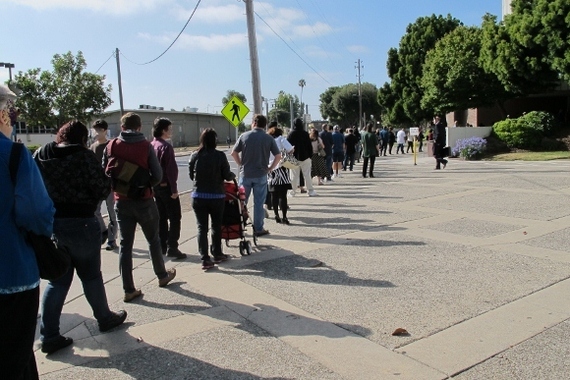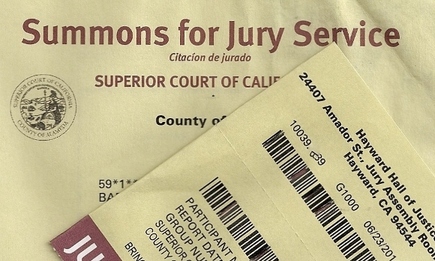Tired of multitasking? Want to get away from your cell phone, your boss, and that roof that's leaking? Get yourself called up for jury duty.
Want to be in a place where one person talks at a time, nobody interrupts, and everybody listens? Try Judge Brenda Harbin-Forte's courtroom at the Hayward, California, Hall of Justice during jury selection.
In Judge Harbin-Forte's courtroom -- and maybe in a courtroom near you -- your job as a prospective juror is to pay attention and listen carefully to other prospective jurors as they answer questions about their life experiences -:
The potential juror whose father was killed in a hit-and-run accident. The one whose mother was struck by a cement truck and is still in pain. The woman who had three back surgeries. And the jock who, fearful of losing his scholarship, played college football despite a painful knee injury.
Mindful Courtroom
It's a setting as quiet and orderly as a zendo, and the jury duty experience is an exercise in mindfulness. There are no distractions. Cellphone use is not allowed. Neither is eating or smoking. And, while the court is in session, there's absolutely no reading, no texting, no googling, no conversation.
You are to pay attention in Judge Harbin-Forte's courtroom. The mind is to be alert and focused, starting right now, with jury selection. No daydreaming. No thoughts of yesterday or tomorrow. The judge's instructions - the law - require you to pay attention.
I was not selected as a juror, so I was excused on the second day, as soon as a jury was empaneled. But those two half-days were a nice little vacation for me - from home, work and the computer keyboard.
It was relaxing. So nice to be allowed - required - to pay attention to just one thing at a time.
Unlike the fast cuts of "Last Week Tonight" or our kitchen TV screen tuned to CNN with its multiple scrolling messages and talking heads drowning each other out - one and only one person at a time was permitted to voice his or her thoughts in Judge Harbin-Forte's courtroom.
Good Manners Back Home
Life should be more like this, I thought. This is civilized. This is a set of norms I've experienced only rarely since I sat in my Aunt Ruth's living room in Scottville, Michigan, one afternoon many decades ago. My nonagenarian grandmother was there; so was a sprinkling of farm-bred aunts and uncles.
I'd flown in from California, where my very coastal young friends were in the habit of getting together to talk - all at once.
My relatives, on the other hand, had seated themselves, not in several small conversation clumps like my talky friends, but around the periphery of the room. Everyone could see and hear everyone else, and no one seemed to be in a
conversational rush. One person spoke at a time, and if something funny happened to be said, there was time to laugh before the next person spoke.
Of course, one might argue that retired Midwestern farm folks are not so much laconic as short on material. Aside from fishing and eating pie, there's not much to do, let alone talk about, in Scottville, Michigan. Somehow you've got to make your stories last till suppertime.
Good Manners as Spiritual Practice
Truth is, I think my country aunts and uncles were on to something.
My friend Jake - a super sophisticated LA type who advises big political muckety-mucks - once gave me some advice to take along on the promotion circuit for my book, "Wrestling with God." When I'm being interviewed, he said, listen to the question. Give it my full attention; don't get caught up in preparing an answer while the question is still being asked.
And then, before speaking, take a couple of seconds to organize my thoughts. What is it that I truly want to say?
Judge Harbin-Forte, my Aunt Ruth, my friend Jake - the message is the same. Do I really want to load the dishwasher, talk to my husband, watch "So You Think You Can Dance," and wipe the chicken grease off the floor all at the same time?
Or would I like to see how it feels to do one thing at a time? Maybe, for example, keep quiet and listen to somebody else talk until they've actually finished saying what they have to say.
c 2015 Barbara Falconer Newhall. All Rights Reserved.
A version of this story first appeared on BarbaraFalconerNewhall.com, where Barbara riffs on life and her rocky spiritual journey. Barbara's interfaith book is "Wrestling with God: Stories of Doubt and Faith."
If you liked this story, you might like, "Jury Duty -- Choose Me, Please." Also, "The Atheists Are Coming -- Out of a Closet Near You."


